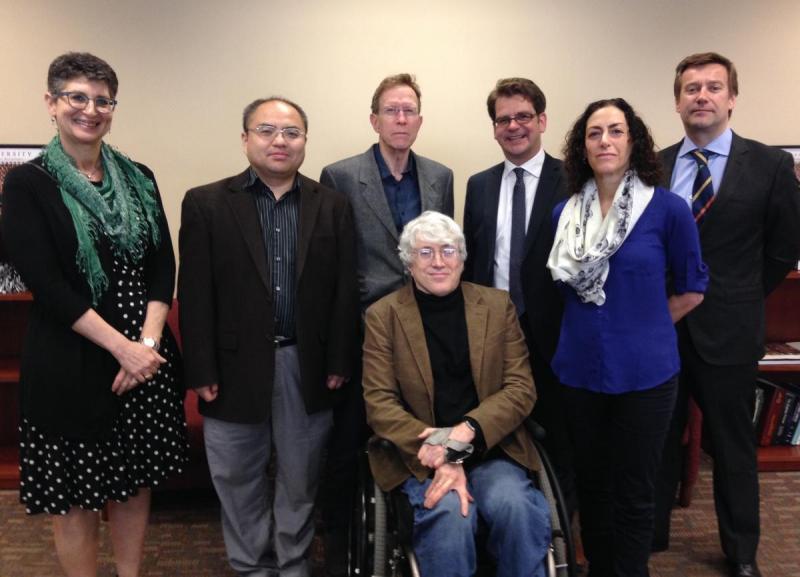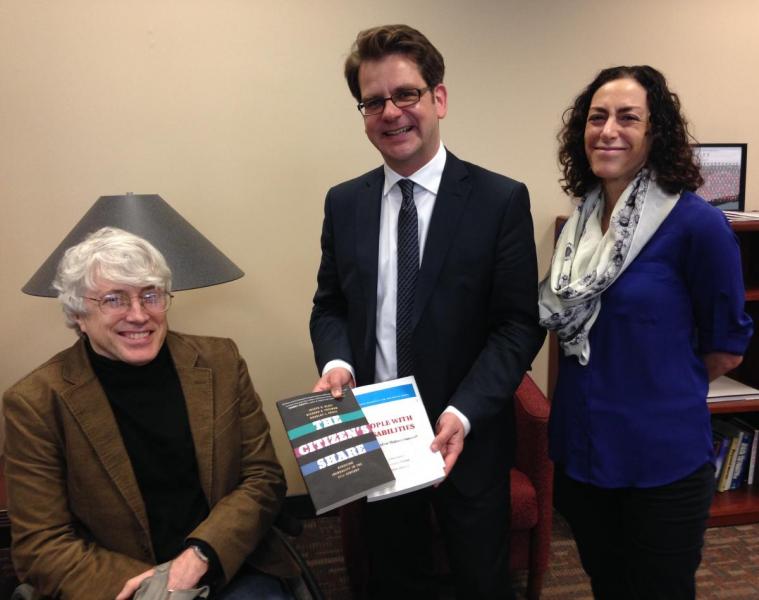

Germany is tapping the expertise of the Rutgers School of Management and Labor Relations (SMLR) to inform national policy recommendations on the future of work.
State Secretary Thorben Albrecht and a delegation from the Federal Ministry of Labour and Social Affairs met with students and faculty members in Piscataway between stops in Boston, Washington and New York City this month.
“This is one of the universities in the U.S. where you really have a very strong labor relations department,” Albrecht said. “We’ve seen that a lot of the debates we are having (in Germany) about the future of work are also issues that are discussed here.”
At a time when robots outnumber humans in some German factories, federal labor officials are discussing the importance of re-training and developing a highly-skilled workforce that cannot be replaced by automation and algorithms.
Albrecht and his team are also exploring the future of collective bargaining, occupational safety and health, and the rapidly-expanding “gig economy,” in which companies use contract workers instead of employees. They are common areas of concern.
Distinguished Professor Douglas Kruse (left) and Professor Lisa Schur give State Secretary Thorben Albrecht a copy of People with Disabilities: Sidelined or Mainstreamed?, a book they authored with Syracuse University Professor Peter Blanck. Kruse also gave Albrecht a copy of The Citizen’s Share. In that text, Kruse, Distinguished Professor Joseph Blasi, and Richard Freeman, the Herbert Ascherman Chair in Economics at Harvard University, make the case for more companies to offer profit sharing to their employees.

“Germany’s national discussion on the future of work will have global implications given their role in the international economy,” said Douglas Kruse, a Distinguished Professor at SMLR and a Research Fellow at Germany’s Institute for the Study of Labor. “It was an honor to talk to the Secretary, and I was very glad to participate with my SMLR colleagues in sharing our knowledge and ideas to help shape the debate.”
Kruse and Professor Lisa Schur, Chair of the Department of Labor Studies and Employment Relations, encouraged Albrecht to give stronger consideration to people with disabilities when developing policy recommendations.
“I described how people with disabilities have long grappled with many of the issues that are becoming widely important across the workforce today, such as the greater need for workplace flexibility, work-life balance, telecommuting, and accommodations for the personal needs of employees,” Schur said.
Inspired by the conversation, Albrecht vowed to explore the issue in greater depth.
“This encouraged me to pick up this aspect (of work),” he said. “You work with your iPad and no longer with a screwdriver. The technological possibilities make it probably easier for people with disabilities to be integrated into jobs in all fields, not only in office jobs.”
SMLR Dean James Hayton, Professor Charles Heckscher, and Associate Professors Janice Fine and Mingwei Liu also attended the two-hour conference, asking questions and exchanging ideas with the five-person German delegation. Assistant Professor Tobias Schulze-Cleven arranged the meeting.
Albrecht will use what he learned at SMLR and other universities to craft a white paper on the future of work later this year. Dean Hayton is hoping to collaborate on research and keep the dialogue going.
“It’s very exciting for us,” Hayton said. “We have an international organization. The reputation of the school is largely within the U.S., but we’re keen to expand that.”
Work 4.0: Re-Imagining Work
Work 1.0 – Birth of the industrial society; first worker organizations (late 1700s)
Work 2.0 – Start of mass production; beginnings of the “welfare state” (late 1800s)
Work 3.0 – Rise of globalization, information technology, and social economy (1970s-2000s)
Work 4.0 – Interconnected digital, flexible work and rising man-machine cooperation (Today)
Source: Federal Ministry of Labour and Social Affairs


